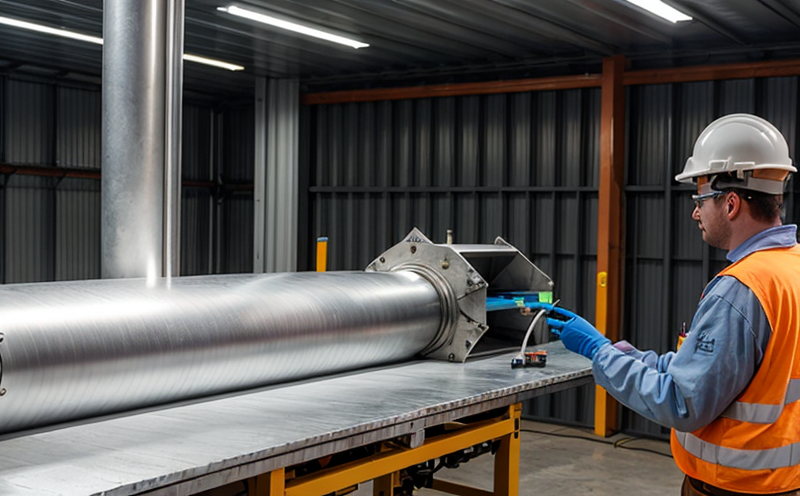ISO 178 Flexural Testing of Plastic Materials in Renewable Systems
The ISO 178 standard specifies methods for determining the flexural properties of plastics under load. This service is particularly relevant to renewable energy applications where plastic materials are used extensively due to their durability, light weight, and resistance to corrosion.
Flexural testing provides critical insights into how a material behaves when subjected to bending forces. In the context of renewable systems, this information is vital for ensuring that components such as wind turbine blades, solar panel frames, and other structural elements can withstand environmental stresses and mechanical loads over their operational lifetimes.
The testing process involves subjecting specimens cut from the plastic material to a defined flexural load until failure. The load-deflection behavior of the specimen is recorded, allowing for the determination of key properties including modulus of elasticity (flexural), yield strength, ultimate tensile strength, and strain at yield or break.
The importance of this testing cannot be overstated in sectors like wind energy and photovoltaics where material integrity directly impacts system performance and safety. For instance, in wind turbine blades, accurate flexural properties help predict fatigue life under cyclic loading conditions, while in solar panel frames, these tests ensure that materials can handle the dynamic loads encountered during installation.
Our laboratory uses advanced equipment compliant with ISO 178 to perform these tests rigorously adhering to international standards. Specimens are carefully prepared according to predefined dimensions and surface finish specifications outlined by the standard. The testing machine applies a controlled load at a specified rate, continuously monitoring deflection until fracture occurs.
The results from this test are essential for quality assurance and product development within the renewable energy sector. Manufacturers can use these data points during design iterations to optimize material selection and improve structural integrity. Compliance officers also benefit by ensuring that products meet regulatory requirements regarding safety and performance.
In summary, ISO 178 flexural testing is a cornerstone of material science in renewable systems. It provides indispensable information about how plastics perform under bending conditions, which is crucial for the longevity and reliability of renewable energy equipment.
Why It Matters
The integrity of plastic materials used in renewable applications is paramount to the efficiency and sustainability of these systems. By conducting ISO 178 flexural testing, manufacturers gain a comprehensive understanding of their material’s mechanical behavior under bending stress.
This knowledge translates into enhanced product reliability and durability, reducing maintenance costs and downtime associated with premature failures. Additionally, it supports regulatory compliance by ensuring that materials meet stringent international standards for performance and safety.
For quality managers and R&D engineers, this service offers valuable insights into material selection and optimization processes. It helps in identifying the most suitable plastics for specific applications based on flexural properties such as modulus of elasticity and yield strength. This data is also crucial during design iterations to enhance product robustness against environmental factors.
Compliance officers rely heavily on accurate test results to validate that products adhere to relevant standards like ISO 178, thereby safeguarding end-users from potential risks. In the broader context of sustainability, ensuring material integrity contributes significantly to the overall lifecycle assessment and environmental impact analysis of renewable systems.
In conclusion, ISO 178 flexural testing is indispensable for achieving high-quality products in renewable energy applications. Its significance lies in its ability to provide detailed mechanical property data that drive informed decisions across various stages of product development and quality assurance processes.
Quality and Reliability Assurance
The process of ISO 178 flexural testing ensures that plastic materials used in renewable systems meet stringent quality standards, thereby enhancing reliability and performance. Rigorous adherence to these tests guarantees consistent material properties across different batches and suppliers.
Our laboratory employs state-of-the-art equipment calibrated according to ISO 178 guidelines to ensure precise measurement of flexural modulus, yield strength, and ultimate tensile strength. These parameters are critical for assessing the mechanical integrity of materials in various environmental conditions relevant to renewable systems.
The testing protocol involves preparing specimens with exact dimensions as specified by ISO 178. Specimens undergo a controlled loading process at specific rates while being monitored closely for deflection until failure occurs. This systematic approach ensures accurate and reproducible results, which are vital for quality assurance and product development.
Moreover, this service supports compliance officers in ensuring that products comply with relevant regulatory requirements such as those outlined in ISO 178. By providing reliable data on material performance under bending stress, we enable manufacturers to meet stringent international standards, thereby safeguarding end-users from potential risks associated with substandard materials.
In summary, ISO 178 flexural testing plays a pivotal role in enhancing the quality and reliability of plastic materials used in renewable systems. Through meticulous adherence to this standard, our laboratory contributes significantly to achieving high-quality products that meet stringent international requirements.
Use Cases and Application Examples
The application of ISO 178 flexural testing is extensive within the renewable energy sector. Below are some specific use cases where this service proves invaluable:
- Wind Turbine Blades: Accurate determination of flexural properties ensures that blades can withstand high wind speeds and cyclic loading, enhancing overall system reliability.
- Solar Panel Frames: Ensuring structural integrity through precise measurement of modulus of elasticity helps prevent premature failure under dynamic loads during installation.
- Battery Cases: Testing the flexural properties of battery cases guarantees durability against mechanical impacts and vibration, ensuring safe operation.
- Turbine Bearings: Reliable assessment of materials used in turbine bearings ensures longevity under continuous rotational stress, minimizing maintenance intervals.
These examples illustrate how ISO 178 flexural testing contributes to the development and implementation of robust renewable energy components. By providing comprehensive mechanical property data, this service supports informed decision-making throughout product lifecycle management.
In addition to these applications, ISO 178 flexural testing also finds relevance in other sectors such as automotive manufacturing and construction. Its versatility makes it an essential tool for ensuring material quality across diverse industries where bending stress plays a critical role.





